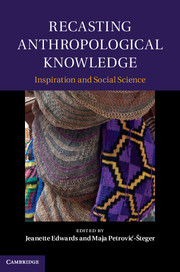17 results
21 - “At Home” in Botox, Feminism, and Ethics
- from Part Four - Desires and Relations
-
-
- Book:
- The Cambridge Handbook for the Anthropology of Gender and Sexuality
- Published online:
- 29 September 2023
- Print publication:
- 19 October 2023, pp 577-600
-
- Chapter
- Export citation
Re-braiding the Strands of Life through Community Rehabilitation, Home Care, and Informal Support: A Longitudinal Collective Case Study
-
- Journal:
- Canadian Journal on Aging / La Revue canadienne du vieillissement / Volume 42 / Issue 1 / March 2023
- Published online by Cambridge University Press:
- 11 July 2022, pp. 80-91
-
- Article
-
- You have access
- Open access
- HTML
- Export citation
Formative evaluation of practice changes for managing depression within a Shared Care model in primary care
-
- Journal:
- Primary Health Care Research & Development / Volume 18 / Issue 1 / January 2017
- Published online by Cambridge University Press:
- 09 September 2016, pp. 50-63
-
- Article
-
- You have access
- HTML
- Export citation
Contributors
-
-
- Book:
- Systems Biology of Cancer
- Published online:
- 05 April 2015
- Print publication:
- 09 April 2015, pp ix-xiv
-
- Chapter
- Export citation
2 - Undoing kinship
- from Part I - Conceptualising relatedness
-
-
- Book:
- Relatedness in Assisted Reproduction
- Published online:
- 05 August 2014
- Print publication:
- 14 August 2014, pp 44-60
-
- Chapter
- Export citation
Frontmatter
-
- Book:
- Recasting Anthropological Knowledge
- Published online:
- 07 September 2011
- Print publication:
- 01 September 2011, pp i-v
-
- Chapter
- Export citation
1 - Introduction
-
-
- Book:
- Recasting Anthropological Knowledge
- Published online:
- 07 September 2011
- Print publication:
- 01 September 2011, pp 1-18
-
- Chapter
- Export citation
Contents
-
- Book:
- Recasting Anthropological Knowledge
- Published online:
- 07 September 2011
- Print publication:
- 01 September 2011, pp vii-viii
-
- Chapter
- Export citation
Index
-
- Book:
- Recasting Anthropological Knowledge
- Published online:
- 07 September 2011
- Print publication:
- 01 September 2011, pp 199-206
-
- Chapter
- Export citation
Contributors
-
- Book:
- Recasting Anthropological Knowledge
- Published online:
- 07 September 2011
- Print publication:
- 01 September 2011, pp ix-xi
-
- Chapter
- Export citation
Bibliography
-
- Book:
- Recasting Anthropological Knowledge
- Published online:
- 07 September 2011
- Print publication:
- 01 September 2011, pp 183-198
-
- Chapter
- Export citation
Acknowledgements
-
- Book:
- Recasting Anthropological Knowledge
- Published online:
- 07 September 2011
- Print publication:
- 01 September 2011, pp xii-xii
-
- Chapter
- Export citation

Recasting Anthropological Knowledge
-
- Published online:
- 07 September 2011
- Print publication:
- 01 September 2011
Contributors
-
-
- Book:
- The Essence of Analgesia and Analgesics
- Published online:
- 06 December 2010
- Print publication:
- 14 October 2010, pp xi-xviii
-
- Chapter
- Export citation
8 - Donor insemination and ‘public opinion’
-
-
- Book:
- Donor Insemination
- Published online:
- 04 August 2010
- Print publication:
- 14 May 1998, pp 151-172
-
- Chapter
- Export citation
‘Parenting Skills’: Views of Community Health and Social Service Providers about the Needs of their ‘Clients’*
-
- Journal:
- Journal of Social Policy / Volume 24 / Issue 2 / April 1995
- Published online by Cambridge University Press:
- 12 June 2009, pp. 237-259
- Print publication:
- April 1995
-
- Article
- Export citation
Alzheimer's disease and Lewy body dementia
-
- Journal:
- The British Journal of Psychiatry / Volume 163 / Issue 5 / November 1993
- Published online by Cambridge University Press:
- 02 January 2018, p. 692
- Print publication:
- November 1993
-
- Article
-
- You have access
- Export citation



